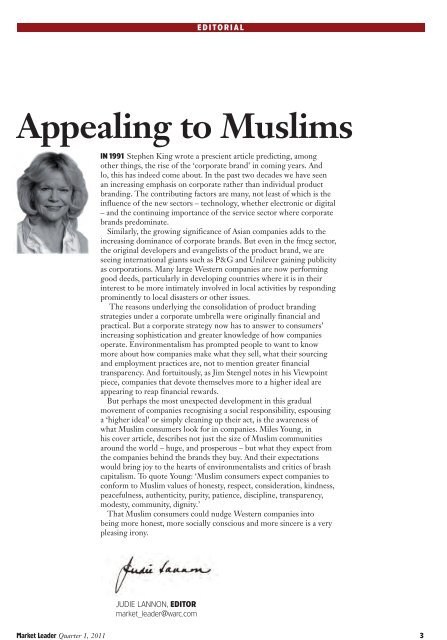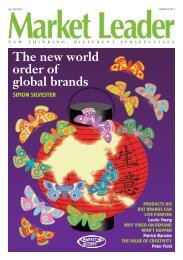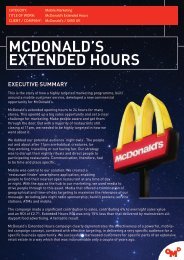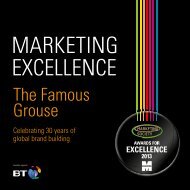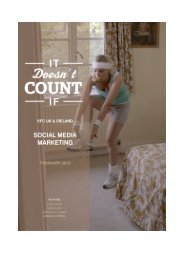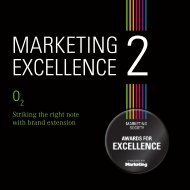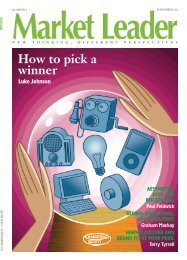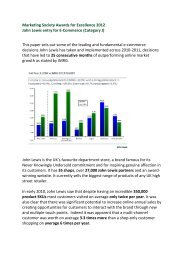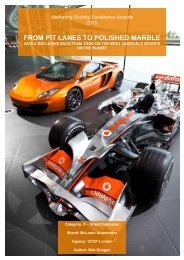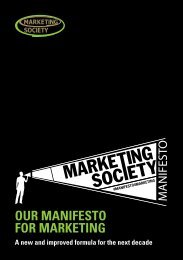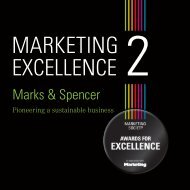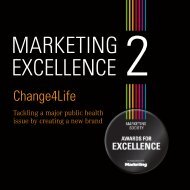MARKET LEADER q1 11 COVER draft 1.indd - The Marketing Society
MARKET LEADER q1 11 COVER draft 1.indd - The Marketing Society
MARKET LEADER q1 11 COVER draft 1.indd - The Marketing Society
You also want an ePaper? Increase the reach of your titles
YUMPU automatically turns print PDFs into web optimized ePapers that Google loves.
E d i to r i a l<br />
Appealing to Muslims<br />
In 1991 Stephen King wrote a prescient article predicting, among<br />
other things, the rise of the ‘corporate brand’ in coming years. And<br />
lo, this has indeed come about. In the past two decades we have seen<br />
an increasing emphasis on corporate rather than individual product<br />
branding. <strong>The</strong> contributing factors are many, not least of which is the<br />
influence of the new sectors – technology, whether electronic or digital<br />
– and the continuing importance of the service sector where corporate<br />
brands predominate.<br />
Similarly, the growing significance of Asian companies adds to the<br />
increasing dominance of corporate brands. But even in the fmcg sector,<br />
the original developers and evangelists of the product brand, we are<br />
seeing international giants such as P&G and Unilever gaining publicity<br />
as corporations. Many large Western companies are now performing<br />
good deeds, particularly in developing countries where it is in their<br />
interest to be more intimately involved in local activities by responding<br />
prominently to local disasters or other issues.<br />
<strong>The</strong> reasons underlying the consolidation of product branding<br />
strategies under a corporate umbrella were originally financial and<br />
practical. But a corporate strategy now has to answer to consumers’<br />
increasing sophistication and greater knowledge of how companies<br />
operate. Environmentalism has prompted people to want to know<br />
more about how companies make what they sell, what their sourcing<br />
and employment practices are, not to mention greater financial<br />
transparency. And fortuitously, as Jim Stengel notes in his Viewpoint<br />
piece, companies that devote themselves more to a higher ideal are<br />
appearing to reap financial rewards.<br />
But perhaps the most unexpected development in this gradual<br />
movement of companies recognising a social responsibility, espousing<br />
a ‘higher ideal’ or simply cleaning up their act, is the awareness of<br />
what Muslim consumers look for in companies. Miles Young, in<br />
his cover article, describes not just the size of Muslim communities<br />
around the world – huge, and prosperous – but what they expect from<br />
the companies behind the brands they buy. And their expectations<br />
would bring joy to the hearts of environmentalists and critics of brash<br />
capitalism. To quote Young: ‘Muslim consumers expect companies to<br />
conform to Muslim values of honesty, respect, consideration, kindness,<br />
peacefulness, authenticity, purity, patience, discipline, transparency,<br />
modesty, community, dignity.’<br />
That Muslim consumers could nudge Western companies into<br />
being more honest, more socially conscious and more sincere is a very<br />
pleasing irony.<br />
Judie Lannon, Editor<br />
market_leader@warc.com<br />
Market Leader Quarter 1, 20<strong>11</strong> 3


